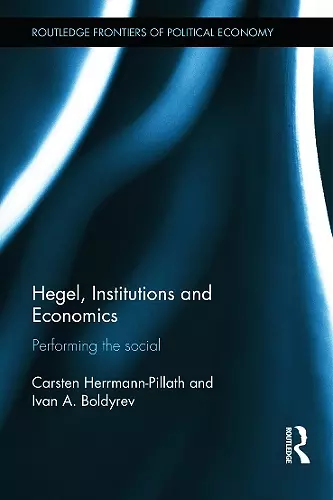Hegel, Institutions and Economics
Performing the Social
Carsten Herrmann-Pillath author Ivan Boldyrev author
Format:Hardback
Publisher:Taylor & Francis Ltd
Published:14th Jan '14
Currently unavailable, and unfortunately no date known when it will be back
This hardback is available in another edition too:
- Paperback£55.99(9781138658226)

Hegel’s philosophy has witnessed periods of revival and oblivion, at times considered to be an unrivalled and all-embracing system of thought, but often renounced with no less ardour. This book renews the dialogue with Hegel by looking at his legacy as a source of insight and judgement that helps us rethink contemporary economics. This book focuses on a concept of institution which is equally important for Hegel's political philosophy and for economic theory to date.
The key contributions of this Hegelian perspective on economics lead us to the synthesis of traditional approaches and new ideas gained in economic experiments and advanced by neuroeconomists, sociologists and cognitive scientists. The proper account of contemporary 'civil society' involves comprehending it as a historically evolving totality of individual minds, ideas and intersubjective structures that are mutually dependent, tied by recognitive relations, and assert themselves as a whole in the ongoing performative movement of 'objective spitit'. The ethics of recognition is paired with the ethics of associations that supports moral principles and gives them true, concrete universality.
This unusual constellation of seemingly remote fields suggests that Hegel, read in a pragmatist mode, anticipated the new theories and philosophies of extended mind, social cognition and performativity. By providing a new conceptual apparatus and reformulating the theory of institutions in the light of this new synthesis, this book claims to give new meaning both to Hegel as interpreted from today, and to the social sciences. Seen from this perspective, such phenomena as cooperation in games, personal identity or justice in the version of Amartya Sen's 'realization-focused comparisons' are reinscribed into the logic of institutional theory. This 'Hegel' clearly goes beyond the limits of philosophical discussion and becomes a decisive reference for economists, sociologists, political scientists and other scholars who study the foundations and consequences of human sociality and try to explore and design the institutions necessary for a worthy common life.
"The authors make a compelling case for the proposition that Hegel is the most important fountainhead for a coherent set of ideas about both economic behavior and political economy that, when expressed in an idiom closer to that of contemporary social science, deserve to be represented in both methodological and policy debates."
Don Ross, Erasmus Journal for Philosophy and Economics
This is a remarkably rich, far-reaching book that explains the implications of Hegel’s thought for economics. It links Hegel with Smith, Sen, Searle and Aoki to address freedom and justice, individual agency and identity, brain science, performativity, institutions, financial capitalism and international trade. An important and thoughtful contribution to current debates in economics and philosophy.
John B. Davis, Marquette University, USA and University of Amsterdam, The Netherlands
In this book an internationally known economist, open to the role of culture and institutions, cooperates with a young Hegel scholar, with an interest in economics, to address the shaky economic world we live in after the financial crisis of 2007--2008. They correctly see that we are currently deficient in understanding the role of institutional arrangements for the functioning of the economy. The authors build upon Hegel’s understanding of the function of institutions for the promotion of human freedom and wellbeing. They are able to make use of their enormous knowledge of economic theory and economic facts to provide case studies which support their overall Hegelian perspective.
Wilfried Ver Eecke, Georgetown University, USA
It is a great idea and ambitious intellectual enterprise to rebuild the foundation of economics on Hegel. Ivan A. Boldyrev and C. Herrmann-Pillath use Hegel’s philosophy for the reconstruction of the institutional base of modern economy. They are interpreting Hegel by Searle, and are able to show Hegel as the missing link between Adam Smith’s theory of morality and Amarty Sen’s notion of justice. It is a wonderful intellectual exercise in rethinking economics in performing the social.
Birger P. Priddat, Witten/Herdecke University, Germany
In this brilliant book Ivan Boldyrev and Carsten Herrmann-Pillath offer new insights into one of the most momentous crises of the twenty-first century -- the financial crisis of 2007--2008 and its aftermath -- by using Hegel's philosophy as key for the understanding of our times. Their expert work shows how alive Hegel's ideas can be in framing the interaction of economics, the broader culture and social institutions -- what Hegel called 'civil society'. This book presents a new 'Hegel', and through him offers us a fresh look at traditional philosophical problems as well as the example of philosophy's productive collaboration with economics and the social sciences.
Angelica Nuzzo, Professor of Philosophy, City University of New York, USA
ISBN: 9780415834032
Dimensions: unknown
Weight: 690g
288 pages